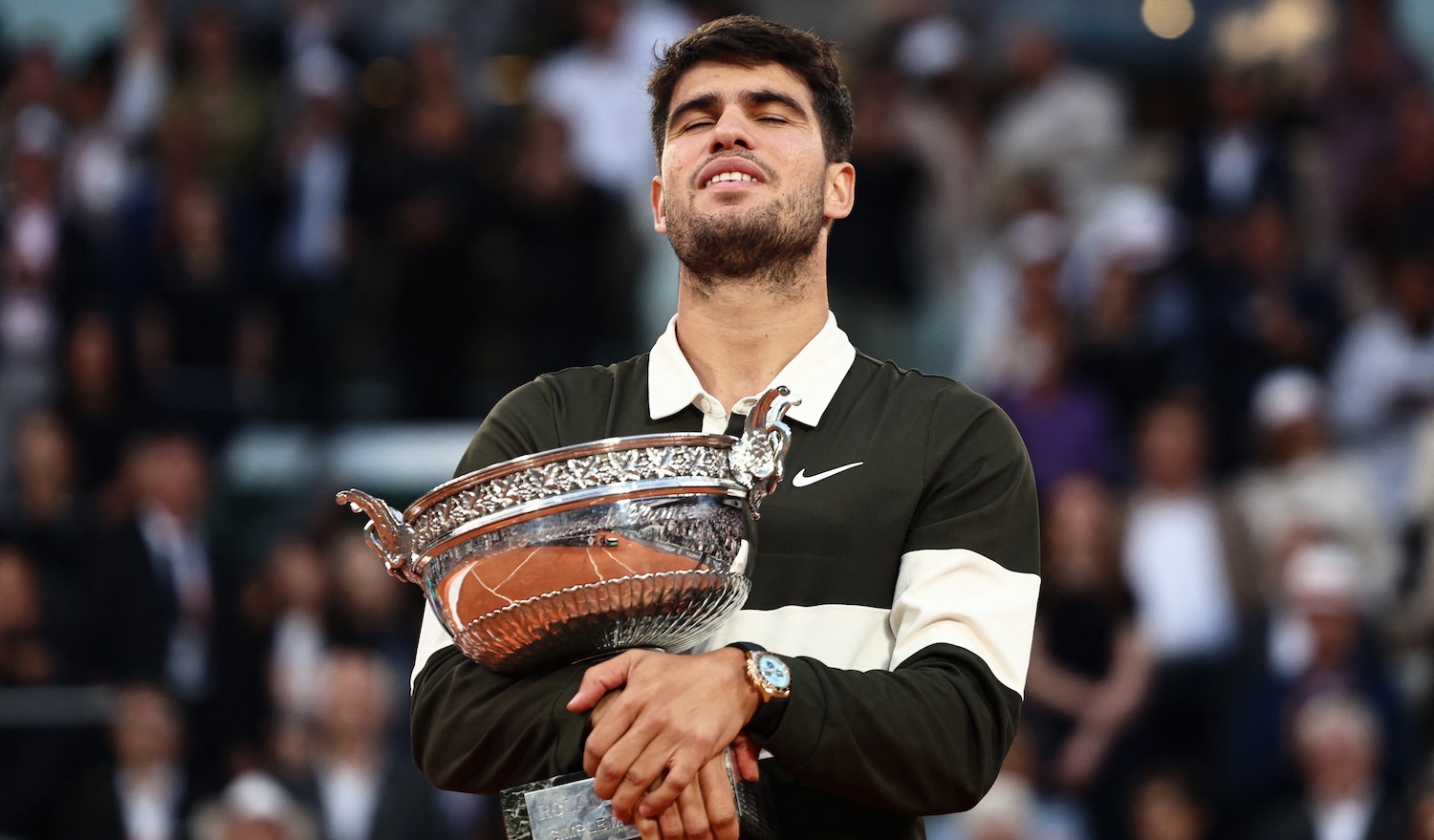A match that perfect deserves no restraint, so: Carlos Alcaraz's 4–6, 6–7 (4), 6–4, 7–6 (3), 7–6 (10–2) French Open final victory over Jannik Sinner is the best tennis match I've ever watched, and one of the greatest sporting events you or I will probably ever have the privilege of witnessing. You do not have to know or care about tennis or either of these players or even sports to find something to love about this match. All you need is a body, to appreciate the limits each player overcame out there on the red clay, and a spirit, to appreciate how deep they each had to dig to reach a place no pair has ever gone at Roland Garros.
The five-hour, 29-minute marathon saw the duo break all manner of records. Alcaraz saved three match points, the first time anyone's ever done so en route to the title. The final was nearly 45 minutes longer than the previous longest French Open final and 24 minutes short of the 2012 Australian Open decider for the longest major final in the open era. Alcaraz had never come back from two sets down, and Sinner had never lost a major final. Neither player had, for that matter. The 12th meeting between Sinner and Alcaraz was comfortably the best, clearing the lofty bar they set three years ago at the U.S. Open.
Neither player can honestly be said to have controlled the match for any amount of time longer than a few games, though Sinner was ahead on the scoreboard almost the entire time. It started with a bang, as Alcaraz forced five deuces on the first game of the match, and while Sinner survived, it took him 12 minutes. That opening game hints at the dynamic of the match: Sinner, in his second tournament following a three-month suspension, had been the most dominant player at the French Open, yet he hadn't had his limits meaningfully tested. In order for Alcaraz to chop Sinner's legs off, he would have to stand up to Sinner's best stuff and meet the challenge.
He very nearly didn't. Sinner met Alcaraz's early charge and rebuffed him, calmly smacking winners and redirecting Alcaraz's force. Alcaraz would pound a big first serve out wide and follow it up with a clean forehand, only for Sinner to belt it at a full sprint. The ball pops off his strings with a malicious directness, denying opponents time and keeping them from advancing in on him. He seems to claw back every break he surrenders. In neutral rallies, Sinner's precision was winning out over Alcaraz's power. The advantage was slight, but real.
Until the third set of this match, Sinner had won 31 straight sets at majors, rampaging through the draw in Paris without letting any of his opponents get into any of the first six matches. There's a good deal of uncertainty about any player, even the most metronomic ball-striker on the ATP Tour, coming back from a three-month layoff, even if it was to serve a suspension rather than rehab an injury. Train all you want, nothing can replicate the pressure of having to show out in front of thousands of fans as your opponent writhes in desperation. Sinner answered every question for 20 of the 21 sets he'd need to win to take the title. Multiple opponents were reduced to ironically celebrating after winning their first game, and even a very good latter-day Novak Djokovic performance was not enough to earn the best men's player of all time a single set off of Sinner.
But just as there's no cleaner or more reliable hitter than Sinner, Carlos Alcaraz brings a level of creativity and athleticism than no player can match. In the third set, Sinner's serve began to falter, and Alcaraz pounced. The Spaniard broke the Italian three times in the third, including a shutout break to take the third set and break the streak. Even after breaking the 31-set streak, Alcaraz was up against it. Sinner was still moving well and pounding the ball, and he pushed Alcaraz to his absolute limits in the fourth set. Sinner broke Alcaraz in four points to take a 4–3 lead, then held in five to move within a game of the trophy. Alcaraz promptly put himself into a 0–40 hole, and it seemed to all the world that Alcaraz was cooked. Three championship points, and, even allowing for a collapse, a chance to serve it out.
Had the match ended there, the final would still have been regarded as a classic. Sinner would have been toasted for wobbling in the third set and storming back to shut out his rival, a rival who had played some fine tennis before forgetting how to serve the ball. The first grand slam final meeting between the two best players of their generation, a pair who are miles above the rest of the field, would have been thought of as a great meeting that hopefully heralded better ones down the line.
Instead, Alcaraz authored something legendary. A wide forehand sent Sinner scurrying out to the serve clock, and his return went just long: 15–40. Sinner inexplicably bopped a backhand return of a second serve long: 30–40. Alcaraz, rocked on his heels by a lancing Sinner forehand, wheels back and delivers a deep shot, which Sinner puts into the net: Deuce. Ace out wide: Advantage Alcaraz. Leaping forehand up the line, from a slight disadvantage, right onto the white chalk: Game, Alcaraz. He held the momentum through to break Sinner quickly, wheeling around with tremendous confidence and hitting a concussive forehand down the line to break Sinner and stay alive at 5–5.
That was the moment Alcaraz seized control of the match. It lasted more than 100 minutes from that point, with Alcaraz winning a tense tiebreak to reach a fifth set, then breaking Sinner immediately upon the start of the fifth. Sinner's legs were hanging on by their sinews. He is not as liquid of an athlete as Alcaraz, and he'd never won a match longer than four hours before. You'd have been forgiven for thinking he was about to hang his head and wait for Alcaraz to put him out of his misery. And Alcaraz tried, mixing in the drop shot with increasing frequency, daring Sinner to come dance with him. The advice from Alcaraz's coaching box was simple: "Look at him," they said. They identified a weakness and told him to kill.
And yet Sinner worked his way back into the match even as his first serve continued to miss. This rivalry is so good because the players can both return rallies to neutral from harrowingly compromised positions and create pressure on every single shot. Against mortals, this leads to some wonky scorelines, as each of them, Sinner in particular, is so good at sending everything back spikily in the neutral game that opponents will die without either player having to go for the finisher. Not so much in this rivalry. Alcaraz would be the second of the pair to serve for the match, deep in the fifth set. This time, Sinner would stonewall Alcaraz, most notably re-dropping a drop shot that appeared to hover millimeters above the dirt to earn a break point. We were headed to a tiebreak.
The match had been balancing on a knife edge for hours. It was so good and so close that the prospect of either man leaving the court with nothing seemed shocking. But there would be one final surprise. With the tension pulled to its tautest, Alcaraz destroyed Sinner. He won the first seven points of the 10-point tiebreak, running away with it after nearly five and a half anxious hours. Alcaraz fell to the clay, and Sinner was left in tears. The match of their lives was over.
Even before the final Alcaraz and Sinner treated us to, it was hard to take any other men's tennis player as a serious contender for anything that matters. Djokovic's athleticism is fading, Alexander Zverev is a mentally fragile choker who can't hit a winner, and Jack Draper isn't quite a good enough athlete yet. Nobody else is a remotely serious challenger to the duopoly. After seeing their first Grand Slam final against each other, three years after getting gateway-drugged into tennis by their first Grand Slam match, it's all I want. They each bring the best out of each other, with Sinner forcing Alcaraz to hold his nerve in tense baseline rallies, and Alcaraz forcing Sinner to get creative and find ways to score beyond being the better rally-ball hitter. They're so young! What a rivalry! It's just getting started! Someone should write a book about it.






